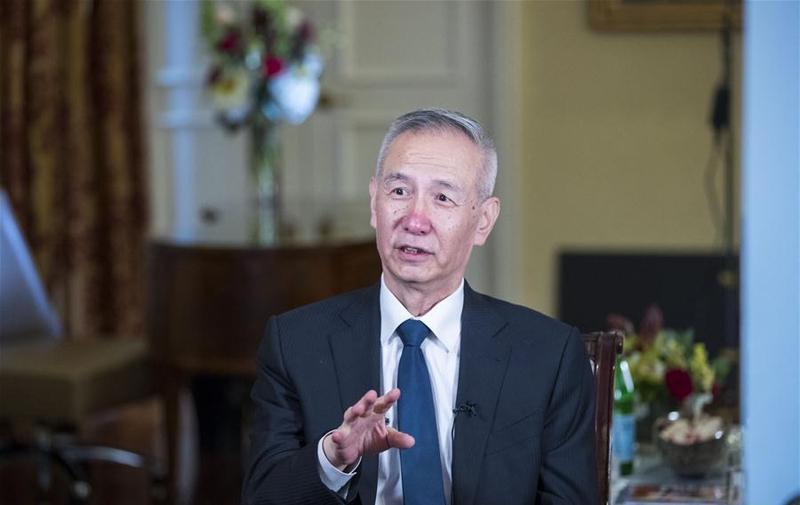
The Financial Times writes that a vague agreement by the US and China to continue talking and try to reduce the trade imbalance between the world's two largest economies has put off the launch of a trade war and may eventually result in a broader peace. But it has also provoked an angry response from hardliners on both sides, illustrating how difficult any peace will be to achieve. Both sides at the weekend agreed to suspend tariffs and continue negotiations over what US Treasury Secretary Steven Mnuchin called a "framework" deal that would see Beijing ramp up its purchase of US goods and services and commit to reducing the US's $337bn annual trade deficit with China. Yet in the US that has fuelled fears among China hawks that the Trump administration may be giving up the leverage it created by threatening tariffs on up to $150bn in Chinese imports earlier this year and sacrificing a broader push for change in China. Liu He, Xi Jinping's top economic emissary, returned home over the weekend to a similar sceptical welcome. Chinese social media users circulated a picture juxtaposing one of Mr Liu's meetings on Capitol Hill with Qing dynasty officials negotiating their surrender after US and European forces crushed the Boxer Rebellion in 1901. Part of the problem for Beijing is that Mr Liu returned home with the fate of ZTE, the Chinese telecommunications company, still hanging in the balance and a seven-year ban on its sourcing of vital US parts still in place.
The Financial Time says that about a week before the Italian election in March, a Franco-Italian group of business leaders met for a shooting weekend in the countryside south of Paris. The aim of the jaunt, a "regular event" according to one person present, was to foster amitié or harmony between business chiefs at a time when chief executives see the opportunity, and necessity, to create so-called European champions to fend off competition from the US and China. With corporate Europe in the throes of merger enthusiasm, a strengthening economy and a desire for greater cohesiveness as a backlash against Brexit, closer corporate integration is high on the bloc's political agenda. The arrival of French president Emmanuel Macron and his Jupiterian vision of a "Grand Europe" has also provided a political drive to create these champions even as Chinese companies push on with potential deals. "Europe's companies are too small," said Carlo Alberto Carnevale-Maffè, professor of strategy and entrepreneurship at Milan's Bocconi University. "European champions could start a new cycle of exporting not just goods but also intangibles, such as services."
- 2018-05-18 Did China Just Bribe Trump to Undermine National Security?
- 2018-05-17 Trump: I 'doubt' China trade negotiations will succeed
- 2018-05-16 Just about everything is odd about Trump’s support of Chinese firm ZTE
- 2018-05-15 Trump, China, ZTE and the art of the deal
- 2018-05-14 Trump throws ZTE curveball as big week for US-China trade begins
- 2018-05-13 Trump orders U-turn over sanctions against Chinese telecom group
- 2018-05-11 How China is working hard to be less reliant on US farmers
- 2018-05-10 China Draws Up a Shopping List of American Goods to Avoid Trade War
- 2018-05-09 China is the big wild card in Trump's Iran decision
- 2018-05-08 Kim’s Second Surprise Visit to China Heightens Diplomatic Drama
- Reuters Oil prices rise with global markets after China, US put trade war 'on hold'
- Reuters China to encourage equity financing to ease debt reliance: report
- Reuters China launches satellite to explore dark side of moon: Xinhua
- Los Angeles Times Taiwan's president pledges more security amid concerns about China
- CNN China tests bombers on South China Sea island
- Fortune US Won't Impose Tariffs on China After Trade Talks, Mnuchin Says
- New York Times US Suspending New Tariffs While Negotiating Trade With China, Mnuchin Says
- The Washington Post Taiwan 'angry' over not being invited to WHO assembly
- Financial Times Multinationals bow to China's political sensitivities
- The Washington Post Trump, South Korean leader commiserate over upcoming summit
- New York Times Island or Rock? Taiwan Defends Its Claim in South China Sea
- Wall Street Journal Want to Invest in Jack Ma? Avoid Alibaba's Rivals
- Bloomberg US-China Trade Truce May Prove Fleeting Without Serious Reform
- Bloomberg Even $200 Billion Isn't Enough
- Wall Street Journal Don't Get Distracted by the Trade Deficit With China
- Fox News Trump beware -- China lies and cheats on trade deals and will likely do so again
- The Diplomat Malaysia Won't Look Away From China So Soon, Despite Mahathir's Words
- Financial Times America beware: dollar supremacy is not forever
